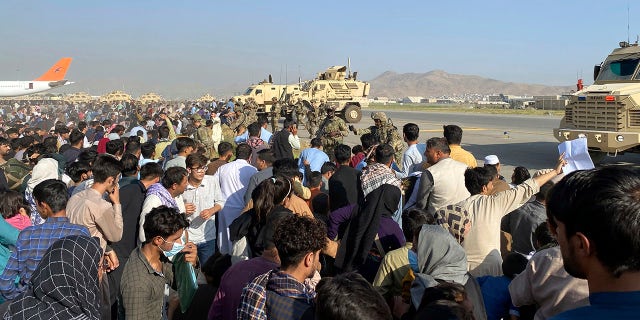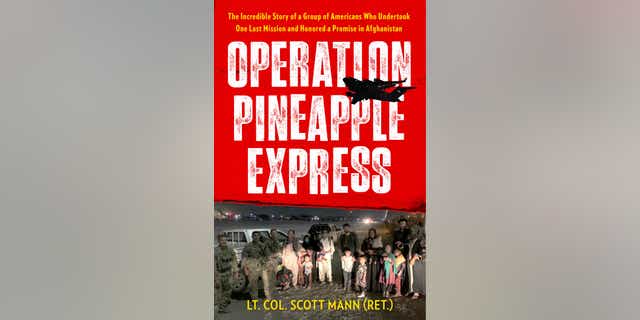In Afghanistan one year ago, Operation Pineapple Express showed the best of America - Fox News
NEWYou can now listen to Fox News articles!
At 3 p.m. on August 15, 2021, Afghan President Ashraf Ghani, his wife, and senior staff boarded three Russian-made MI-17 helicopters and fled the country hours before the Taliban stormed the palace. Afghanistan was in freefall. Word had spread that "the Americans and NATO were leaving—forever."
Former government workers, security force members, or anybody who worked with coalition forces were at risk, but Afghan Special Operations Forces were in the most danger as they had done most of the fighting in Afghanistan in recent years as the regular army and police forces faded away in the face of Taliban mind games and violence. But men like Master Sergeant Bashir Ahmadzai had fought to the bitter end. Tall and broad with an unruly mop of wavy hair, Bashir graduated from the U.S. Special Forces Qualification Course and was one of the most trusted Afghan special operators among Green Berets. He had hunted Taliban alongside U.S. forces for over a decade.
There were thousands of such men and women across Afghanistan: they served loyally and they were suddenly the prey of the Taliban. The only option for these Afghan patriots was to make it to the last American bastion, Hamid Karzai International Airport (HKIA).
Easier said than done.
BIDEN'S DUMB, DANGEROUS AFGHANISTAN DECISION: IT WILL HAUNT US FOR DECADES
The airport was in total chaos, a seething mass of people. Tens of thousands of Afghans were gathered around the airport's perimeter. Outside the few gates that still permitted entry, the crowds were so desperate that men, women, and children were crushed to death.

FILE --U.S soldiers stand guard along a perimeter at the international airport in Kabul, Afghanistan, Monday, Aug. 16, 2021. (AP Photo/Shekib Rahmani)
The United States military forces in HKIA—Marines, paratroopers, and Delta Force—were ordered to maintain defensive positions by the Biden administration, with limited authority to go outside the airport gates. The senior leaders from U.S. Special Operations Command made no discernible moves or actions to help Afghans, abandoning allies without a thought. Senior Pentagon leaders said privately that while there was a "moral obligation" to save Afghan partners, the United States had no "legal obligation" to do so.
Task Force Pineapple decided to stand up and help.
GREEN BERET VETERAN: THIS MEMORIAL DAY WAS EXTREMELY HARD AFTER AFGHANISTAN WITHDRAWAL
Our group's name evolved as a meme that a few of us threw together when we helped an Afghan commando, our first passenger, on the run. He was given the password "Pineapple" by a State Department official trying to get him inside HKIA.
The response from the civilian community was astounding and positive beyond anything I ever imagined in the divided time we live in. In fact, it illuminated even further stark contrasts between institutional leaders who divide us over narrow agendas, while ordinary Americans step up.
My phone was blowing up from Afghan Special Ops partners in duress, but not because I was some highly sought-after extraction expert; I'd long since retired from the Army. But senior military and civilian leaders weren't stepping up, and Afghans were turning in desperation to everyone they knew.
I was still a member of a tight-knit community of Special Operations Veterans who were disgusted by what was happening. We had paid our dues. We had fought hard to put the loss and the pain behind us. And we were sucked back into Afghanistan by a colossal failure of American leadership.
Time was running out and the security forces at HKIA couldn't discern between the hunted Afghan special operations forces who had fought to the last bullet and the tens of thousands of other Afghan faces all yearning to get out of the country. We could help. It came down to relationships.
Standing up for our old Afghan comrades was our focus. Over one hundred volunteers would ultimately join Task Force Pineapple. Thousands more would join other volunteer groups, each with their own story. Women. Men. Warriors. Civilians. Different politics. Different ideologies. Every single one focused on honoring the promises we made in Afghanistan.
People like Zac Lois, a Green Beret who had served a brutal tour of duty in the remote mountains of Kandahar Province, Afghanistan. He had tried to put the ghosts of Afghanistan behind him, but when his interpreter and other Afghan Special Forces brothers pleaded for help, he took a leave of absence from teaching high school social studies and joined Pineapple.

Jay Redman, a Navy SEAL whose face was disfigured by combat wounds received in the war he thought he'd left behind, attempted to guide an Afghan Special Operator and his family to freedom. During the evacuation, the Afghan family's daughter was trampled within an inch of her life in the roiling crowd outside HKIA's Abbey Gate. The family was forced to abandon their escape attempt in order to get her medical aid. Rather than guiding them to freedom, Jay found himself consoling the father over the cell phone, anxiously awaiting word if his little girl would live or die.
Former Green Beret Will Lisles, a double amputee, attempted to extract his former interpreter, Kazem, who had saved him when he stepped on a landmine in 2010.
Kelley Currie, Ambassador at Large for Women's Affairs in the Trump administration, built a network to help at-risk Afghan women find freedom when the bureaucracy at the State Department let her down.
There were scores more in our network with similar stories.
Our entire effort functioned off virtual networks, agile technology, and most of all, trust. Relationships were the rocket fuel that drove these recovery efforts. Somewhere between 700 and 1,000 Afghans made it out on the Pineapple Express until our efforts were cut short by an ISIS-K suicide bomber on August 26. The bomb killed 13 U.S. servicemen and countless Afghans, including several Afghan girls and National Mine Removal Group members who were trying to escape on the Pineapple Express.
Flowers grow out of rocky ground.
CLICK HERE TO GET THE OPINION NEWSLETTER
Jane Horton lost her husband Chris, an Oklahoma National Guard sniper, in Afghanistan in 2011, and spent nearly a decade looking for answers to Chris's death. She found them in the hearts and souls of the amazing Afghan people and served as an unofficial ambassador to Afghanistan. As Kabul fell to the Taliban, she guided a 25-year-old single Afghan woman to freedom who now lives with her in Washington, D.C.
Nezam Nezami, a decorated Afghan commando, inspired my first efforts to help. Today he lives near me in Tampa with his wife and three children.
Zac Lois's interpreter, who drew him into this desperate effort, lives near Zac in Syracuse with his wife and children.
This is the best of America.
The response from the civilian community was astounding and positive beyond anything I ever imagined in the divided time we live in. In fact, it illuminated even further stark contrasts between institutional leaders who divide us over narrow agendas, while ordinary Americans step up.
CLICK HERE TO GET THE FOX NEWS APP
Our country will make it through this dark period of division, but we all have a role to play in demonstrating what leadership looks like. Volunteer groups are an integral part of any successful civil society. Citizen groups as varied as Alcoholics Anonymous, the Junior League, and the NAACP have historically played significant roles in urging America to better days.
The Afghan volunteer groups like Dunkirk, Moral Compass, Team America Relief, and Pineapple demonstrated what leadership looks like. But looking ahead to the storms on our national horizon, it's clear the job is not done.
Comments
Post a Comment